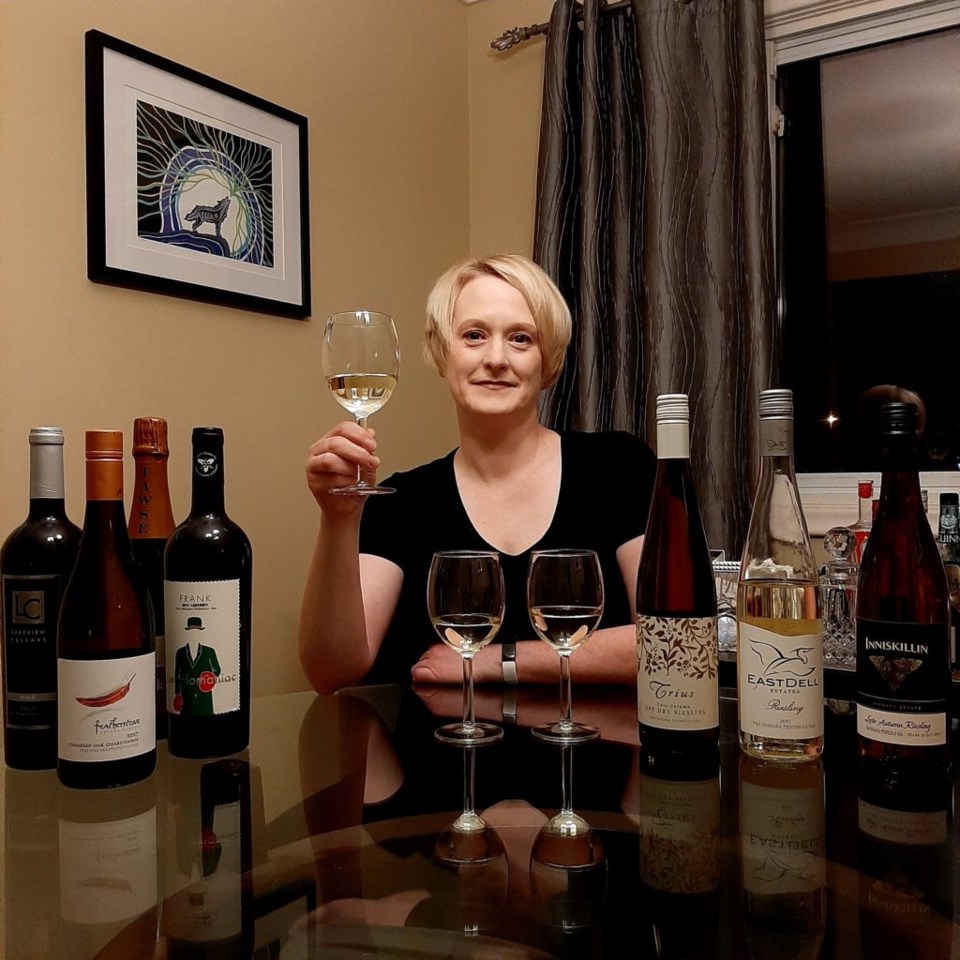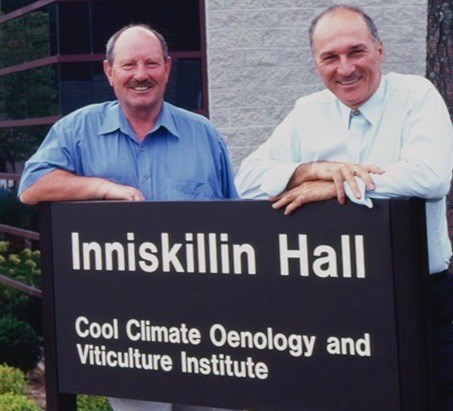
I have been writing for The Local newspaper a little over a year now. I mostly cover events and write about the people of Niagara-on-the-Lake.
I have the pleasure of attending a lot of the fun stuff that happens in town; whether it be historical, cultural, or even sometimes paranormal, although at this time, in the middle of a pandemic, there isn’t as much to cover. I have, however, had the pleasure of visiting many of the wineries in the area. These visits have renewed my interest in wine.
That led me to a course featuring Ontario wines and wine production, and of course before long, I began looking at this project as a reporter.
It also had me reminiscing about a man I met many years ago, when he offered me a pair of his pants.
“Your dad is offering me his pants,” the teenaged me whispered with slight desperation to my friend, Max Kaiser. “What?” he replied.“Why?”
“I split my pants playing volleyball, and your dad is trying to help by offering a pair of his pants. Can you please get me something from one of your sisters?”
Off we went to the laundry room to find something more suitable, and I changed into a pair of Magda’s sweatpants (Sorry Magda if you are just finding out about this now). I showed Max’s dad that Max found me a pair of pants, thanked him and went back to playing volleyball in the Kaisers’ backyard. That was the first conversation I remember having with Karl Kaiser.

So it seems fitting that the Ontario Wine Certificate course I recently completed was through the Continuing Education department of the Cool Climate Oenology and Viticulture Institute at Brock University, which he helped to create.
I wanted to learn more about Ontario wine, but I realized that was not the full answer to the question of why I decided to take the course.
As a kid, growing up in this area, I could count the months, from spring to summer to autumn, depending on which fruit was in season. I could count those same months by how the grapes on the vines looked, and knew that harvest time also meant Grape and Wine parade time. I remember sneaking sweet and bubbly sips of Baby Duck sparkling wine at my parents’ cocktail parties. They enjoyed wine with dinner, and my mom enjoyed a little smidgen of port in the evening. My sister and I would even be given a little wine with our dinner on special occasions.
In my last year of high school I came to Niagara District Secondary School (NDSS) in Virgil, the year it became the School of Performing Arts. Apparently I had a bit of a reputation for being a drama queen, and was invited to attend. So I transferred from my St. Catharines high school, taking the bus every day from the north end of the city to Virgil.
When I arrived at NDSS, I met a couple of girls also from St. Catharines, who shared the same drama queen status. The three of us found it difficult to make friends at our new school. The kids at NDSS had known each other since Kindergarten and were shy of “city” people, but slowly, we started to get to know the other students. Among my new friends was this kid named Max, a cute guy with dark curly hair and a gentle demeanor.
At some point I found out that Max’s dad made wine. At first that didn’t mean much to me, as my parents had friends who made wine too, albeit mostly in their basements. Eventually, I learned that Max’s dad was the co-founder and winemaker for Inniskillin Wines, and Max was a good friend to have when we went to parties with a couple cases of wine in his trunk.
On occasion, I hung out at the Kaiser household, enjoying the family hospitality, good times and good food, including the best bratwurst I have ever tasted.
In January, 1988, when Max Kaiser asked me to go pick grapes in -10 degrees Celsius, you think I would have jumped at the chance to be part of the historic effort to produce icewine in the Niagara Region, right? I didn’t. I was an 18-year-old who thought she would have a hard time convincing her parents she was going to stay out all night in a vineyard with a bunch of teenaged boys and pick grapes in the cold. And it was really, really cold.
I should have gone to pick the grapes. I regret not being part of that, but teenaged me did not understand the significance of the initial efforts these wine-producing pioneers would have on the Ontario and Canadian wine industry.
My upbringing in the Niagara Region, and my introduction to Max and his family, however, has led me to be a proud supporter of the wine produced in this region. As an adult, I have always enjoyed Ontario wines, deviating little from the Niagara Region, but not fully understanding what makes our area, this region and the province so special. Until I took this introductory course into wine and the wine industry in Ontario. My instructor was Mark Pistor, a winemaker who holds an honours degree in Oenology and Viticulture from Brock University. He has also worked as a winemaker for Ontario wineries, including Dark Horse Estate Winery in Grand Bend and Alvento in Vineland Station.
Highlights from the course included a brief history of Ontario wine, the wine appellations of Ontario, winemaking, choosing a wine and of course, tasting and food pairings. We learned about the appellations and sub-appellations and regional appellations of Ontario, about the Vintner’s Quality Alliance (VQA), its inception and its mandate. We learned about the vineyard, including the vines, the soil, the climate and the grape varieties. Pistor then covered winemaking from harvest to bottle. One of my favourite lessons, and one of the most daunting, was tasting. I am still working on developing my palate. Lastly, Pistor offered practical tips on different types of wine styles and how to choose them. The final lesson and major project was on wine and food matching.
Karl Kaiser’s influence was felt throughout the course. We learned of just a few of his major achievements, starting in 1975 when he and Donald Ziraldo established Inniskillin Wines, and were granted the first winery license in more than 50 years. He harvested the first icewine in 1984. Led by Ziraldo, Kaiser and other Ontario wine pioneers established the VQA in 1988. By 1991, Kaiser’s 1989 Vidal Icewine won the Grand Prix d’Honneur at Vinexpo in Bordeaux, France. In 1996, he created the Cool Climate Oenology and Viticulture Institute, and the Oenology and Viticulture undergraduate program at Brock University — the very same Institute that granted me my Certificate in Ontario Wine.
This course gave me a new appreciation for the area I live in, and a better understanding of the pioneers of the local wine industry, including Karl Kaiser and what his efforts have accomplished here in the region and in Ontario.
I had a chance to briefly chat with Max recently. He reminded me that this past Sunday marked the third anniversary of his father’s passing. Karl died Nov. 22, 2017.
When I reminded Max of the story of splitting my pants in his backyard, he laughed and said, “that sounds like him. My dad would have given someone the shirt off his back, or I guess, even his pants.”
Thanks again Dr. Kaiser. I may have declined to wear your pants, but through this introductory course, and as I continue my wine education, I have come to know you better, and appreciate your many achievements.


